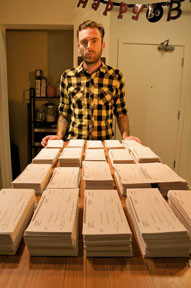Residents of Hong Kong, worried by China’s recent moves to stamp out the remnants of democratic political power there, have for been engaging in large-scale “Occupy”-style protests. You may have heard this in the news under the names “Occupy Central” or the “umbrella movement.”
The occupy-style street protest phase of this movement is coming to a close, or at least a pause, whether from dwindling momentum, diminishing returns, or a ramping up of authoritarian repression. So now the movement is switching tactics. On , a coalition of groups launched a “non-cooperation movement” featuring forms of tax resistance.
The two tax resistance tactics being proposed are modest and largely symbolic in nature. Residents of government-run housing are being asked to delay their rent payments as long as possible (公屋延遲交租 — Gung Uk Yinchi Jou), without actually risking eviction. Taxpayers are being asked to pay in a way that causes inconvenience for the state — by dividing up their tax payments into a number of individually-submitted, small amounts (分拆支票交稅 — Faanchaak Jipiu Gaau Seui) of HK$6.89, $68.90, or $689. These amounts are meant to be symbolic of the 689 members of the 1,200-member election committee who elected anti-democratic, Beijing-leaning Leung Chun-ying as Hong Kong’s chief executive.

the non-cooperation movement has designed a set of rubber stamps to help people fill out multiple, small, symbolic tax payment checks and to decorate them with protest messages
Franklen K.S. Choi says the coalition behind the new movement is still developing its tactics. Choi promoted the idea of tax resistance this way: “Taxpayers’ money should not be used to feed a violent government.” They hope the tactics they have adopted thus far, which are not illegal, will encourage people to join the campaign who might otherwise be too timid to challenge the government. They also hope to put pressure on the government both by delaying payment and by increasing the administrative costs of tax and rent processing. There have also been hopes expressed that this protest might become something like a popular referendum on the Leung administration.
They are getting some push-back from opponents of the democracy movement, including some who say that these tactics will just increase the workload and frustration of low-level data processors without having much other impact.
If you read Chinese or are patient with the current state of automated translation, you can follow some of the deliberations and pronouncements of the movement at their Facebook page or at inmediahk.net, or you can search for “良心抗稅運動” or “Leungsam Kongseui Wandung” (Conscientious Tax Resistance Movement).
This is the first time someone from a foreign tax resistance movement has reached out to me for advice, so I’m finding this to be particularly exciting. They definitely seem to have a hunger for historical precedents (e.g. the tax resistance examples of Thoreau, the anti-Poll Tax movement in the U.K., and the women’s suffrage movement).
American war tax protester Evan Reeves has been held up as an example for his action of paying his U.S. federal income tax with 5,574 separate checks as a protest. (One Hong Kong protester, Raymond Kwong, plans to break the record by paying with 9,280 checks.)
I’ll keep my eyes on this movement as it develops, as best as I can through the language barrier anyway, and will post updates here as I learn more.


